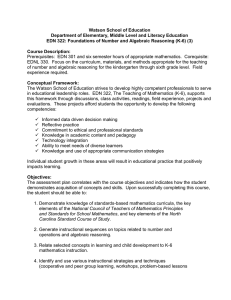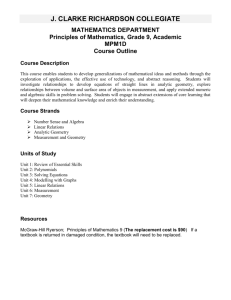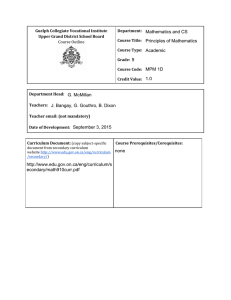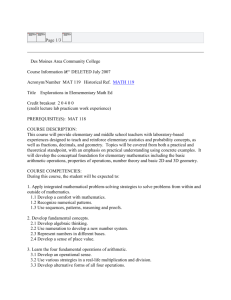Watson School of Education
advertisement
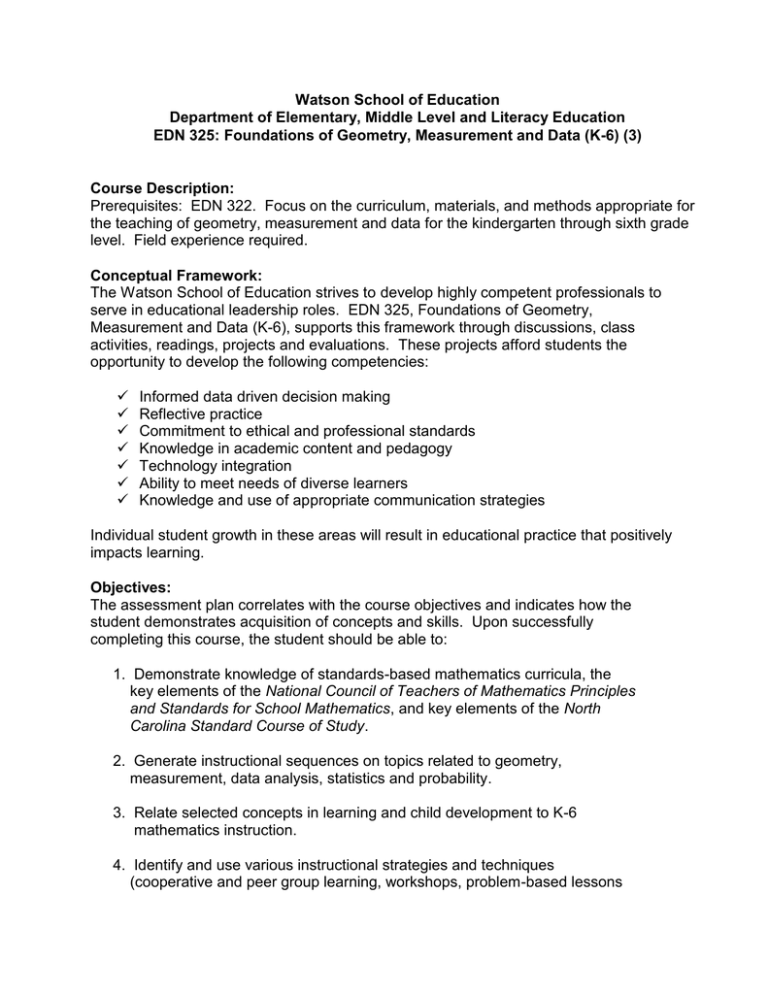
Watson School of Education Department of Elementary, Middle Level and Literacy Education EDN 325: Foundations of Geometry, Measurement and Data (K-6) (3) Course Description: Prerequisites: EDN 322. Focus on the curriculum, materials, and methods appropriate for the teaching of geometry, measurement and data for the kindergarten through sixth grade level. Field experience required. Conceptual Framework: The Watson School of Education strives to develop highly competent professionals to serve in educational leadership roles. EDN 325, Foundations of Geometry, Measurement and Data (K-6), supports this framework through discussions, class activities, readings, projects and evaluations. These projects afford students the opportunity to develop the following competencies: Informed data driven decision making Reflective practice Commitment to ethical and professional standards Knowledge in academic content and pedagogy Technology integration Ability to meet needs of diverse learners Knowledge and use of appropriate communication strategies Individual student growth in these areas will result in educational practice that positively impacts learning. Objectives: The assessment plan correlates with the course objectives and indicates how the student demonstrates acquisition of concepts and skills. Upon successfully completing this course, the student should be able to: 1. Demonstrate knowledge of standards-based mathematics curricula, the key elements of the National Council of Teachers of Mathematics Principles and Standards for School Mathematics, and key elements of the North Carolina Standard Course of Study. 2. Generate instructional sequences on topics related to geometry, measurement, data analysis, statistics and probability. 3. Relate selected concepts in learning and child development to K-6 mathematics instruction. 4. Identify and use various instructional strategies and techniques (cooperative and peer group learning, workshops, problem-based lessons and teacher-directed presentations, etc.) to teach mathematical content topics appropriate for grades K-6 to all children. 5. Identify and use selected manipulatives and technology to teach appropriate mathematics content for grades K-6. 6. Integrate mathematics content with other elementary subjects. 7. Identify and use alternative methods for assessing students’ work in mathematics in grades K-6, including informal diagnostic techniques. 8. Modify mathematics curriculum and instruction to meet individual needs. 9. Solve problems in the mathematical content areas of geometry, measurement, data analysis, statistics and probability, appropriate for adaptation to grades K-6. Texts: Reys, Robert; Lindquist, Mary; Lambdin, Diana; and Smith, Nancy. Helping Children Learn Mathematics, 8th ed. ISBN 0-471-71095-4 Course packet. EDN 322 and EDN 325, The Teaching of Mathematics K-6 Task Stream Account Mini DV Tapes Expectations: Attendance Because the instructor will model various practices advocated for classroom use, and because peer interaction is an important component of learning in this course, promptness and active participation is expected at every class. Missing more than two (2) classes may result in a failing grade. Two (2) tardies and/or early departures are equivalent to one absence. If you are absent, please see the instructor upon your return for materials distributed in class. It is also helpful to confer with a classmate concerning material you missed. COURSE OUTLINE Date Topic Week 1 The NCTM Standards and Principles Week 2 Geometry : Properties of Two- and Three-Dimensional Shapes Week 3 Geometry: Visualization and Spatial Reasoning Week 4 Geometry: Locations and Spatial Relationships Week 5 Geometry: Transformations, Videotape Reflections Week 6 Measurement: The Measurement Process Week 7 Measurable Attributes: Length/Area Week 8 Measurable Attributes: Perimeter/Volume Week 9 Measurable Attributes: Weight, Time and Temperature, Videotape Reflections Week 10 Week 11 Week 12 Week 13 Week 14 Week 15 Week 16 Techniques, Tools and Formulas for Measuring Data Analysis Process: Posing a Question and Collecting Data (Surveys, Experiments and Simulations) Data Analysis Process: Data Analysis and Interpretation Descriptive Statistics: Measures of Variation/Measures of Central Tendency, Videotape Reflections Probability Probability Videotape Reflections *Please complete the assigned reading before class. Effort: Successful completion of EDN 325 requires active class participation, thoughtful completion of assignments, and careful consideration of all assigned reading. Tests will cover all assigned readings and projects as well as material discussed in class. TESTS Midterm Final 100 points 100 points ____ ____ The midterm will focus on the foundations of K-6 mathematics as covered up to the date of the test. The final exam will focus on topics covered after Test I, but may include material from any part of the course. All class discussions, handouts, and assigned readings may be included. Because it is an unsuccessful strategy, cramming is not recommended. PROJECTS Detailed descriptions of the following projects and grading criteria are included in the course packet. All materials submitted must be well-edited and typed. You may neatly handwrite any assignment to be submitted on a required form. Projects which do not meet these standards will not be graded. Grades on late projects may be decreased. 1. Performance Evaluation Scale (PES) Possible Points Attained Points 10 points ____ (5 points pre; 5 points post) 2. Software or Web Resource Review 20 points ____ 3. Activity Construction 25 points ____ 4. Lesson Plans and Videotaped Teaching 100 points ____ 5. Connections Lesson 20 points ____ 6. Field Experience Successful completion of the field experience requires 10 hours of teaching in the areas of geometry, measurement or data using a hands-on approach. Lesson plans must be approved before they are taught and must include the use of developmentally appropriate manipulatives. Grading: During this course, you can earn a total of 375 points. All tests and assignments are listed below. No extra projects will be accepted. Please keep a running total of the points you have earned on this syllabus. Grades will be determined as follows: A = 357-375 points A- = 338-356 points B+= 326-337 points B = 315-325 points B- = 300-314 points C+= 289-299 points C = 278-288 points C- = 263-277 points D = 225-262 points F = below 225 points INTEGRATION OF TECHNOLOGY Through completion of the projects described above, students will design developmentally appropriate learning opportunities that apply technology-enhanced instructional strategies to support the diverse needs of learners. This work will be done through the use of TaskStream, a web-based curriculum builder and portfolio toolset, and other technology resources. TaskStream: The Watson School of Education requires that all education majors enrolled in methods courses maintain an active account on TaskStream. You are asked to maintain that account for the duration of your program with the Watson School of Education (www.taskstream.com). Students in these courses will use TaskStream to maintain a Professional Development Portfolio. This portfolio includes evidence of your work to demonstrate progress toward meeting exit requirements and professional standards. Your instructor will advise you on how to obtain this account. Videotape: Videotape yourself a minimum of two times as you work in your. The point of this exercise is to learn more about how to evaluate your own performance as a teacher. The following guidelines taken from Tools for Teaching by Barbara Gross Davis should prove helpful in completing this assignment: Plan to view the videotape on the same or next day so that you can readily recall what you were thinking and feeling as you taught. Watch the tape once or twice to get used to seeing yourself on tape. During the first viewing, most people tend to focus on their voice, appearance, gestures, and mannerisms - "Do I really sound like that?". Understand that these details are exaggerated on tape and are far less noticeable and distracting in real life. Spend your time concentrating on effective teaching. Once you've adjusted to seeing yourself on tape, set aside sufficient time to analyze it. A rule of thumb may be to spend two hours for every one-hour of class time. Focus on your strengths as well as those aspects needing improvement. Submit a reflection for each required videotaped session addressing the following questions: What are the specific things I did well? What are the specific things I could have done better? What did students seem to enjoy most? What did students seem to enjoy least? What three things would I change next time I teach this session? Academic Honor Code Adherence to standards of professional conduct is expected in EDN 322. Please familiarize yourself with the requirements of the UNCW Academic Honor Code and the Watson School of Education Standards of Professional Conduct. These documents can be found in the course packet and on the course webpage. Performance Evaluation Scale You will be introduced to the Performance Evaluation Scale which is used during the internship. You will be asked to do a self-evaluation using these criteria. You will also identify your current areas of strength and what areas of growth you want to focus on at this time. Disability Services: **If you are a person with a disability and anticipate needing accommodations of any type in order to participate in this class, you must notify Disability Services (962-7555), provide the necessary documentation of the disability and arrange for the appropriate authorized accommodations. Once these accommodations are approved, please identify yourself to me so that the accommodations can be implemented.
